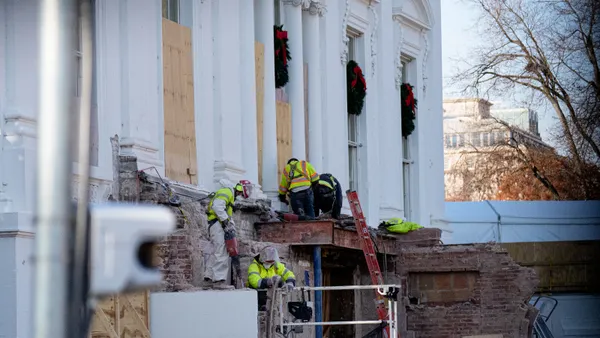Dive Brief:
- Manhattan District Attorney Cyrus R. Vance's office and representatives of several other New York City agencies gathered last week to announce criminal charges against two construction supervisors in the wake of a June 2018 crane accident that resulted in serious injuries to two workers. Terrence Edwards and Timothy Braico, both employees of St. Louis-based subcontractor Western Waterproofing Co. (dba Western Specialty Contractors), each face two charges of felony assault and two charges of misdemeanor reckless endangerment.
- Prosecutors allege that construction manager ZDG LLC hired Western to install the façade for an 11-story building, which included a curtain wall that used both stainless steel and glazed window panels. The DA's office claims that Braico had a mini crane delivered to the Harlem site and that Edwards directed employees to use it without proper training and without an engineering plan — that specifies crane use and tethering — approved by the city Department of Buildings. While ironworkers Christopher Jackson and Jorge Delgado were working a floor below the crane guiding the curtain wall panels as the crane lifted the material, the untethered crane fell four stories to the ground below, hitting Delgado in the back along the way and causing Jackson to fall three stories.
- The DA's office said that Western cooperated with the investigation and entered into a deferred prosecution agreement, the terms of which require Western to hire an independent monitor, increase worker safety training and pay for English- and Spanish-language public service announcements about workers' rights to a safe workplace. "As the use of these remotely operated, lightweight cranes continues to grow," Vance said, "contractors must ensure their workers are trained and their plans are DOB-approved, and always make sure these dangerous pieces of equipment are securely tethered."
Dive Insight:
New York City's DOB has specific procedures in place for mini crane use, including submission of a permit application and detailed plans, as well as proof of operator and rigging crew certification. According to the DOB, a crane is considered "mini" if it is mobile and wheel- or tread-mounted, has a maximum boom length of 50 feet — including jibs and extensions — and has a manufacturer's rated capacity of three tons or less.
OSHA last week issued its own final rule on crane operator certification requirements. The new regulation requires operators to be certified by either type or capacity and to receive ongoing training as necessary. The new agency regulation also requires employers to evaluate operators and document those evaluations. The effective date for operator certification is Dec. 9, 2018, but employers have until Feb. 7, 2019, to meet the evaluation and documentation requirements.













